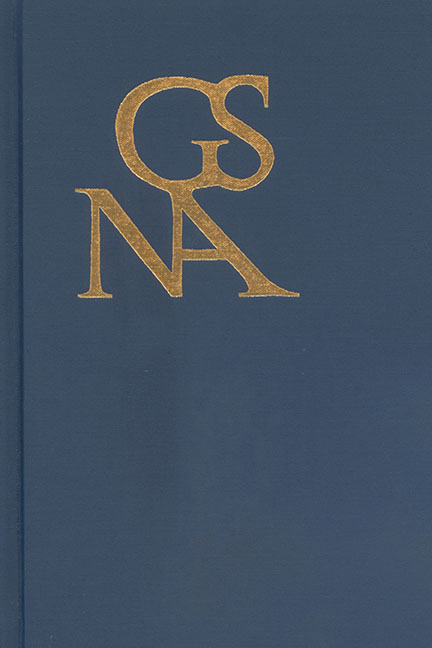Refugee Reception in Goethe’s Hermann Und Dorothea
Published online by Cambridge University Press: 28 October 2020
Summary
GOETHE PUBLISHED Hermann und Dorothea in 1797. Described by Wilhelm von Humboldt as a work that was “zugleich so rein und idealisch,” (simultaneously so pure and ideal) the poem was popular and well-received by contemporary readers, eliciting wide-ranging support from critics who praised Goethe's portrayal of a distinctive German bourgeoisie and its staid response to the historical turmoil of the French Revolution. Modern literary scholarship has largely continued to focus on the interaction between the two main characters of Hermann and Dorothea, elaborating on the symbolism and repercussions of their relationship, while differentiating between the seemingly contrastive concepts of Bürgertum and Weltbürgertum (citizenship and world citizenship) that the characters purportedly espouse. This article takes these analyses one step further by investigating the poem's overall response to the political crisis underway and by pointedly examining the depiction of refugees within the context of this late eighteenth-century narrative, considering their migratory status and purpose, while also evaluating the wide-ranging and sometimes fraught concept of citizenship. In doing so, it draws on contemporary discussions pertaining to topics of identity, national belonging, and state responsibility vis-à-vis refugees within political borders, thereby positioning Hermann und Dorothea as a narrative that articulates some of the challenges that occur in today's increasingly mobile and transnational world. This article thus involves interrogating the processes of group identity formation and individuation at work within the text.
Goethe had engaged with the subject matter of exile in previous literary works, most obviously in Iphigenie auf Tauris (1787) and Unterhaltungen Deutscher Ausgewanderten (1795; Conversations of German Refugees). In both of these works, he explored the theme of enforced absence from a homeland, elucidating the behavior and mindset of the exiled individual as an essential part of the narrative. In Hermann und Dorothea he continues with similar themes of loss and departure, while also accentuating the conditions of historical violence that propel people to leave their homes and seek refuge elsewhere. That said, Hermann und Dorothea is arguably also very different from the aforementioned works in its own particular focus on exile, as it concentrates on the arrival and reception of refugees in their new community, highlighting some of the challenges refugees face in their new surroundings and in the immediate aftermath of the exilic journey.
- Type
- Chapter
- Information
- Goethe Yearbook 27 , pp. 83 - 100Publisher: Boydell & BrewerPrint publication year: 2020

